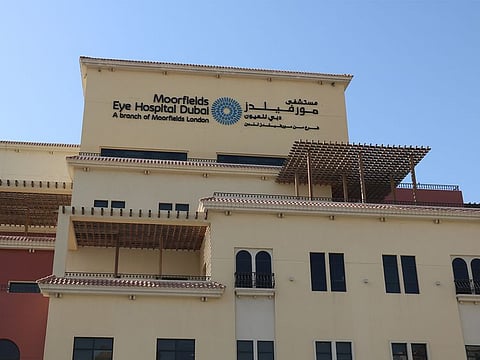Moorfields Eye Hospital Dubai redefines best practices in eye care
The eye care facility has set up measures for long-term patient benefit and sustainability

Highlight
Moorfields Eye Hospital Dubai has rolled out initiatives such as virtual consultations to allow delivery of eye care to patients without them needing to be physically present, helping them stay safe while continuing its commitment to patient care.
The new paradigm of Work from Home (WFH) and e-learning brought on by the Covid-19 pandemic has put an extra load on a very vital sensory organ -- the eyes.
According to reports, on average a person is spending 33 per cent more time on digital devices owing to pandemic restrictions. To make matters worse, eye care is neglected, as people are reluctant to visit medical centres. At least 10,000 people are at risk of suffering irreversible damage to their sight because of missed appointments, experts say.
Moorfields Eye Hospital Dubai has stepped in to address these challenges.
“What may have been considered best practices in a healthcare environment or setting a few months ago, may need to be reassessed and adapted to the current and the future healthcare landscape,” says Elhadi Hassan, Managing Director, Moorfields Eye Hospital Dubai. “Over the past several months, we have periodically changed the way we provide our services, as part of both the short and long-term strategy to help our patients and to help sustain our organisation as a whole.”
Impaired vision is associated with a diminished quality of life and decreased survival expectancy in the middle-aged and elderly population, according to last year’s data from the World Health Organisation. Globally, at least 2.2 billion people have a vision impairment or blindness, of which at least a billion have a vision impairment that could have been prevented or has yet to be addressed.
Moorfields Eye Hospital Dubai has rolled out initiatives such as virtual consultations to allow delivery of eye care to patients without them needing to be physically present, helping them stay safe while continuing our commitment to patient care. “This initiative helps us continue to provide an option to attend a consult with a visiting doctor for example that is otherwise still unable to travel to the UAE, it also helps our international patients, who comprise 15% of our patient base, consult with one of our subspecialised doctors,” says Dr Ammar Safar, Medical Director, Moorfields Eye Hospitals UAE.
“Operationally, the challenges and regulatory changes have led us to assess our patient journey time and improve on this without compromising the quality of care provided. The paediatric ophthalmology team, for example, reviewed the dilation protocol. New criteria were set, lowering the age at which dilation is mandatory for certain conditions.”
In parallel, more stringent infection control is a key priority for the hospital, with changes in policies and monitoring controls for hand washing, sterilising, and equipment cleaning, in addition to rearrangement of all seating areas for patients within the hospital to maintain safe distancing between all areas. Appointments have been spread out to avoid crowding. While multiple family members were once welcomed to attend appointments, this has been reduced to only one accompanying escort to ensure safety of staff and other patients in the waiting areas, with masks to be worn as a mandatory measure by all. At check- in, registration, and cashier departments, pens used by patients are now single use only, until disinfection of each is completed, along with limited paper contact.
“During a time when, globally, investing in what would be regarded as an unnecessary expenditure has been reduced, we have carefully considered the long-term benefit and our ongoing commitment to patient and staff safety,” says Maha Aboughali, Business Development and Marketing Director, Moorfields Eye Hospital Dubai. “In order to further improve infection control, we have invested in more permanent additional protective measures for patients and staff.”
Thermal body temperature scanners have been installed at the main entrance of the hospital, and all patients and staff temperatures are monitored daily. The hospital has also invested in new protective screens at all main patient facing areas including registration, cashier, pharmacy and all doctors’ offices, to maintain safe distance between staff and patients. Cameras have been added in each of the doctor's clinics to allow a magnified view of the eye safely from a distance.
Moreover, the hospital conducts weekly disinfection by a Dubai Municipality approved and accredited company. “The new normal and best practice for most clinical staff at the hospital are now to wear scrubs,” says Dr Safar. “These are changed on arrival to and out of before leaving the hospital and sent out daily for professional cleaning. From a surgical standpoint, patients that require general anaesthesia will have to complete a wellness test by an external hospital before any procedure is confirmed, and sedation is recommended in some cases as an alternative. Full personal protective equipment (PPE) is worn by all staff in theatre during general anaesthesia procedures, and deep cleaning is completed in the theatre area after each and every case."
Moorfields Eye Hospital Dubai is the first overseas branch of Moorfields London and provides world class outpatient diagnostic and treatment for the full range of both surgical and non-surgical related eye conditions, for both adults and children, from basic screenings and eye health checks, to retinal surgery, laser refractive surgery, cataracts, corneal grafts, diabetic retinopathy treatment, squint correction surgery, oculoplastic surgery, genetic eye disease consultations and counselling, and ocular oncology services through a team of permanent and visiting consultants.
For more information visit www.moorfields.ae/Dubai.
This content comes from Reach by Gulf News, which is the branded content team of GN Media.